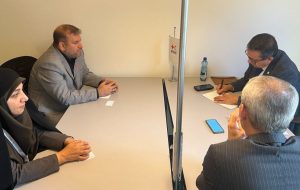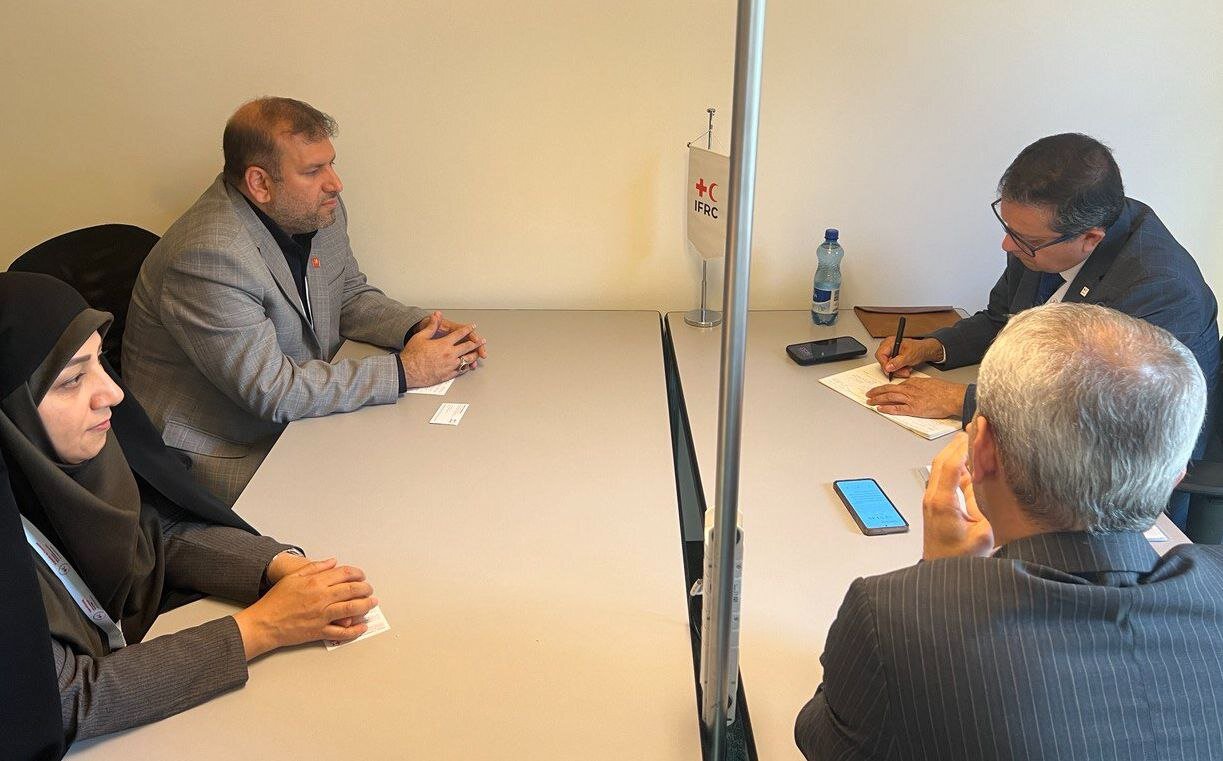IRCS, IFRC discuss ways to enhance co-op in crisis management
TEHRAN –The Iranian Red Crescent Society (IRCS) and the International Federation of the Red Cross and the Red Crescent Societies (IFRC) have explored the potential to boost joint activities in crisis management and addressing natural disasters, particularly in the Middle East and North African (MENA) region. On the sidelines of the 34th International Conference of the Red


TEHRAN –The Iranian Red Crescent Society (IRCS) and the International Federation of the Red Cross and the Red Crescent Societies (IFRC) have explored the potential to boost joint activities in crisis management and addressing natural disasters, particularly in the Middle East and North African (MENA) region.
On the sidelines of the 34th International Conference of the Red Cross and Red Crescent, the IFRC undersecretary general for national society development and operations coordination, Xavier Castellanos Mosquera, held a meeting with the IRCS secretary general, Meysam Afshar, and the IRCS director for international affairs, Razieh Alishvandi.
Acknowledging the IRCS capacities, Castellanos Mosquera highlighted that the IRCS is well-known all over the world for its high capabilities.
The IFRC is interested in enhancing cooperating with the IRCS on conducting joint specialized training courses, and organizing different teams, like logistics teams, the IRCS website reported.
“The International Federation of Red Cross and Red Crescent Societies has different specialized groups and teams active in various sectors. Considering the capacity, knowledge, and valuable experiences of the Iranian Red Crescent Society, we are eager for the society to join these groups and teams to further support their peers as well as the federation,” the IFRC official went on to say.
Afshar, for his part, elaborated on logistic capacities and the capabilities of the IRCS in rescue and relief services, pharmaceutical and medical equipment productions, Helal textile products, medical and rehabilitation centers in the country, and 14 other countries.
Referring to accident-prone areas in the country, especially the areas susceptible to natural disasters like earthquakes, floods, and drought, the official called for more support from the IFRC to deal with the problems in these regions.
“The Iranian Red Crescent Society has applied for the Capacity Building Fund (CBF) and the National Society Investment Alliance (NSIA) fund regarding water management projects and is still waiting to receive the funds. The faster the society receives the funds, the better the projects will be implemented,” Afshar noted.
During the meeting, Alishvandi, for her part, proposed expanding cooperation with other societies in the region through establishing a regional network for aid and assistance as well as holding joint programs, and joint regional maneuvers in coordination with the IFRC.
Referring to cruel sanctions, particularly on medicines, Alishvandi said the coercive sanctions have influenced and delayed the delivery of international financial aid in times of crisis, so the IFRC should find a way to tackle the problem.
The 34th International Conference of the Red Cross and Red Crescent was held from October 28 to 31 in Geneva, Switzerland.
The conference Is held every four years, bringing together representatives of the states parties to the Geneva Conventions, Red Cross and Red Crescent National Societies, the IFRC, and the International Committee of the Red Cross (ICRC).
The conference was held under the theme of Navigate Uncertainty – Strengthen Humanity.
This year’s conference agenda focused on important issues such as compliance with International Humanitarian Law, safeguarding humanitarian access, and the protection of civilians and humanitarians.
The International Conference is a platform for collaboration and dialogue. Its apolitical nature ensures that the focus remains steadfastly on humanitarian action and collective commitment to save lives and alleviate suffering.
Discussions cantered particularly on compliance with international humanitarian law; enhancing the protection of civilians and humanitarians; the promotion of sustainable locally-led humanitarian action; anticipation, preparation, and adaptation in the face of the climate challenge, the importance of ‘disaster law’; the impact of digital technologies in warfare.
Sanctions hinder Iran to address natural disasters
The imposition of unilateral sanctions by the United States on Iran has significantly hindered the country’s capacity to address humanitarian emergencies effectively, according to the IFRC.
These sanctions have restricted access to vital resources, including medical supplies and equipment, thus impeding disaster response initiatives and worsening the effects of natural disasters on already vulnerable populations, the IFRC website reported in a press release on October 10.
Iran is highly susceptible to seismic events, with earthquakes occurring frequently and resulting in severe humanitarian crises. Additionally, seasonal flooding poses a significant risk, often intensified by deforestation and inadequate infrastructure. For instance, in 2019, extensive flooding affected over 25 provinces, leading to loss of life, large-scale displacement, and widespread damage to homes and critical infrastructure.
The World Risk Index 2023 and the vulnerability rate for Iran suggest that Iran has a relatively high level of vulnerability and the significant lack of coping capacities highlight the need for improved disaster preparedness and capacity building.
The challenges issuing from the pandemic, coupled with increasing US sanctions imposed in mid-2018, have led to the deterioration of Iran’s economy. Unemployment and inflation rates have increased, weakening the banking system and decreasing income generation in the country. With limited fiscal space and high inflation, economic pressures on poor households are expected to continue.
The country’s recovery is projected to be slow and gradual. The repeated sanctions on Iran have led to a wide range of negative economic outcomes for Iran, which include the rapid devaluation of the Iranian currency, severe trade and fiscal deficits, inflation, and a rise in the poverty rates in the country.
Moreover, Iran is home to a substantial number of refugees, primarily from neighboring Afghanistan. The country continues to face a multitude of humanitarian challenges, such as natural disasters, economic strain, displaced populations, and public health crises.
MT/MG
